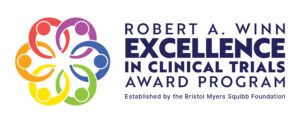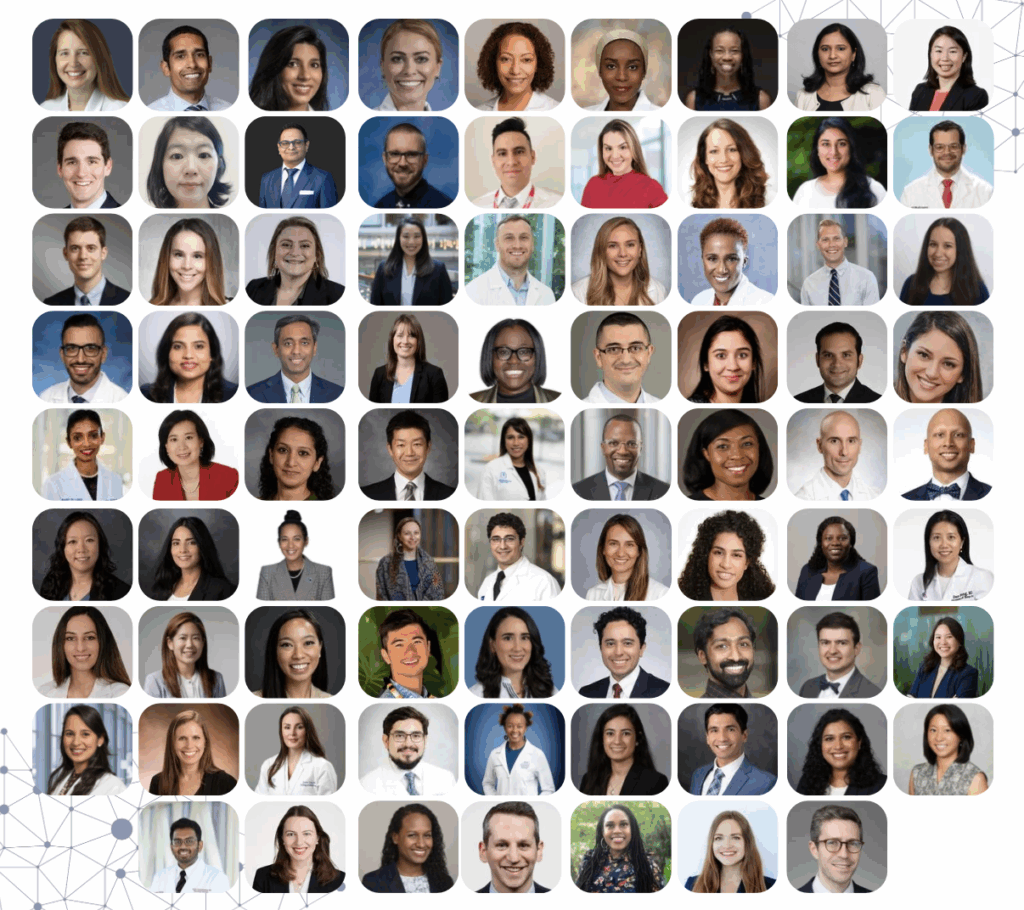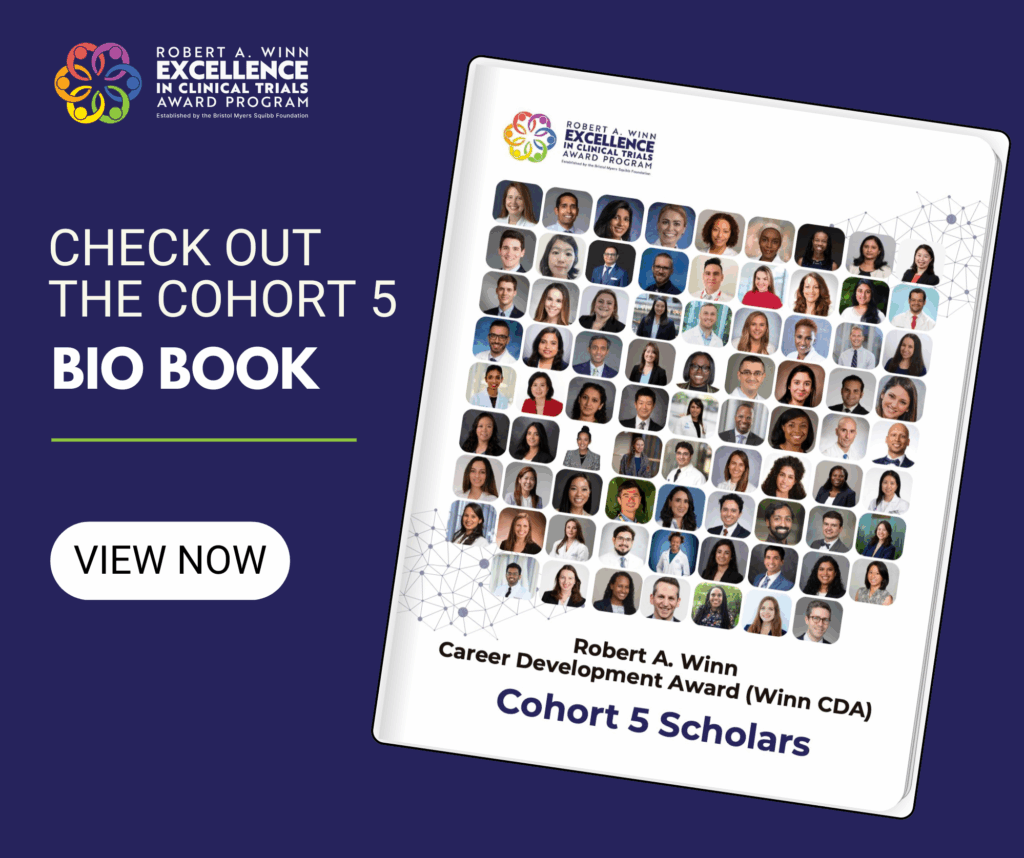The Robert A. Winn Excellence in Clinical Trials Award Program (Winn Awards) recently announced 79 new physician-researchers from across the United States have been selected to join the fifth annual cohort of the Winn Career Development Award (Winn CDA) program, which features a rigorous two-year curriculum designed to advance community-focused clinical research.
The Winn Awards – a national program out of VCU Massey Comprehensive Cancer Center established by the Bristol Myers Squibb Foundation (BMS Foundation), an independent charitable organization, and also funded by Gilead Sciences, Amgen, and Genentech – exists to address one of medicine’s most persistent challenges: ensuring that all patients, particularly those not typically enrolled in research, benefit from cutting-edge science. Its mission is to improve participation in clinical studies so that treatments developed are tested, safe, and effective for all who will use them, and that people in hard-to-reach communities have better access to the latest advances in medicine.
The Winn Awards accomplishes this by implementing programs to train and educate a national network of community-oriented clinical trialists. The two-year Winn CDA program is the only program of its kind that provides rigorous training in both clinical trial design and implementation as well as the science of community engagement. Each scholar receives a two-year, $240,000 award that secures protected time to pursue research, deepen community partnerships, and advance clinical trial access – all while continuing to care for patients in the communities they serve.
Currently, the program’s research areas include cancer, cardiovascular disease and immunologic disorders. Through an intensive experience that blends research, formal instruction, mentorship, hands-on experience, in-depth workshops, annual convenings, and a capstone project, Winn CDA scholars become experts in conducting community-oriented trials that achieve maximum generalizability through superior recruitment, enrollment, and retention – particularly in communities that historically have low participation in clinical studies.
The new Winn CDA cohort will convene in Albuquerque, New Mexico in November, for a 4.5-day workshop on the design and implementation of clinical trials developed with the American Association for Cancer Research (AACR), an organization that has partnered with Winn Awards since the program was founded.
“The Winn Awards embody the spirit of collaboration and commitment that is essential to advancing cancer science for the benefit of all people,” said Margaret Foti, PhD, MD (hc), chief executive officer of the American Association for Cancer Research (AACR). “The AACR is honored to partner with this important program to help train and empower the next generation of physician-scientists who are designing and leading clinical trials that reach diverse patient populations. We are deeply committed toward seeing the goal of this vital work become a reality.”
Industry Collaborating for the Greater Good
The Winn Awards program was founded in 2020 with a $100 million commitment from the BMS Foundation. Since its inception, three more funding partners have joined this mission: Gilead Sciences, Amgen, and Genentech. They are united in their commitment to advancing the Winn Awards mission of Better Science for All: transforming the clinical research landscape to ensure that scientific breakthroughs benefit every community.
“It is remarkable to see so many partners across industry and academics come together to tackle this major problem in healthcare,” said Dr. Robert A. Winn, the program’s namesake and Director of VCU Massey Comprehensive Cancer Center. “So much progress has been made in medical research in the last few decades, but clinical trials must include people from all communities in order to ensure that the treatments are effective for everyone. That includes people in rural areas that health care facilities don’t quite reach. We want to make sure the science serves everyone, especially those who are often forgotten or left out of the conversation.”
“When we launched the Winn Awards five years ago, our goal was to empower a new generation of clinical trialists to bridge the gaps between cutting-edge research and the communities too often left out of advances in medical innovation. With their deep commitment to community-oriented research and their determination to ensure everyone can access the best possible treatments, this year’s tremendous class of Winn CDA scholars reflects that vision in action,” said Catharine Grimes, president of the Bristol Myers Squibb Foundation. “The Bristol Myers Squibb Foundation is proud to support these talented physician-researchers, and we look forward to seeing the continued impact of their work in the communities they serve.”
“Advancing medical research and driving community engagement requires collaboration,” said Michael Levy, SVP, Medical Affairs and Regulatory Affairs, Patient Safety & Quality at Gilead Sciences. “The Winn Awards program has brought together partners from across the industry to tackle a shared mission, and Gilead is proud to be part of this effort. By supporting the next generation of physician-researchers, we are helping to break down barriers to participation and build a stronger future for healthcare that benefits all communities.”
“At Amgen, we believe the future of healthcare depends on ensuring that innovation reaches every patient,” said Ponda Motsepe-Ditshego, vice president, Inclusive Global Health and Impact, Amgen. “The Winn Awards program reflects this vision by investing in healthcare professionals who truly represent the communities we serve. By supporting this initiative, we are not only addressing long-standing barriers in clinical trials but also building a foundation for scientific discoveries that will deliver better outcomes for generations to come. This is how we shape a future where breakthrough medicines improve and extend lives across all communities.”
“Genentech is proud to support the Winn Awards, advancing our shared mission to transform clinical research and ensure it is inclusive for all patients,” said LaVanya Hardin-Wright, Head of Giving & Social Impact, Genentech. “This program is uniquely positioned to train physician-researchers to engage communities who experience barriers to participating in clinical trials. We look forward to championing these scholars as they develop innovative, patient-centered approaches that will improve the future of medicine for everyone.”
The Winn CDA program is more than a training initiative; it is a catalyst for change. By equipping scholars to become transformative leaders in both patient care and research, it is forging a future where communities historically left out of clinical trials are meaningfully engaged. These scholars are redefining how patients are recruited, enrolled, and retained, creating a model of research that is more impactful.
Meet Cohort 5 of the Winn Career Development Award Program
This year, the Winn CDA program received a record 243 applications, a testament to the quality of the program. The 79 physician awardees represent 43 different healthcare institutions in 23 states across the U.S., plus the District of Columbia. They were selected by an independent national review committee made up of prestigious healthcare leaders from organizations throughout the nation.
The physician-researchers selected are committed to improving participation in research and represent varied perspectives and therapeutic areas, including cancer (hematologic or solid tumors), immunologic disorders, and cardiovascular diseases.
The scholars selected for cohort five of the Winn CDA program are listed below. You can also read their biographies in the 2025 Winn CDA Cohort 5 Bio Book.
- Ash Alpert, MD, MFA, ScM | Funded by The Bristol Myers Squibb Foundation | Yale Cancer Center
- Chidinma Anakwenze, MD, MPH | Funded by Gilead Sciences | The University of Texas MD Anderson Cancer Center
- Anna Arroyo, MD | Funded by The Bristol Myers Squibb Foundation | Stanford University School of Medicine
- Adanma Ayanambakkam, MBBS, MS | Funded by The Bristol Myers Squibb Foundation | University of Oklahoma Health Stephenson Cancer Center
- Priscila Barreto Coelho, MD | Funded by Gilead Sciences | Sylvester Comprehensive Cancer Center – University of Miami
- Felipe Batalini, MD | Funded by Gilead Sciences | Mayo Clinic
- Adam Berman, MD, MPH | Funded by The Bristol Myers Squibb Foundation | NYU Langone Health / NYU Grossman School of Medicine
- Teresa Boitano, MD | Funded by Gilead Sciences | University of Alabama at Birmingham
- Christopher Cann, MD | Funded by The Bristol Myers Squibb Foundation | The Research Institute of Fox Chase Cancer Center
- Ayushi Chauhan, MD | Funded by The Bristol Myers Squibb Foundation | The University of Texas MD Anderson Cancer Center
- Kelly Chien, MD | Funded by The Bristol Myers Squibb Foundation | The University of Texas MD Anderson Cancer Center
- Dai Chihara, MD, PhD | Funded by The Bristol Myers Squibb Foundation | The MD Anderson Cancer Center
- Nirmal Choradia, MD | Funded by The Bristol Myers Squibb Foundation | Oklahoma University Health Sciences Center
- Janice Chyou, MD, FACC, FAHA, FHRS | Funded by The Bristol Myers Squibb Foundation | Icahn School of Medicine at Mount Sinai
- Jordan Ciuro, MD | Funded by The Bristol Myers Squibb Foundation | Emory University
- Virginia Corbett, MD | Funded by The Bristol Myers Squibb Foundation | Icahn School of Medicine at Mount Sinai
- Malamo Countouris, MD | Funded by The Bristol Myers Squibb Foundation | University of Pittsburgh Medical Center
- Glenda Delgado Ramos, MD | Funded by The Bristol Myers Squibb Foundation | University of Texas Southwestern
- Mary Carter Denny, MD, MPH | Funded by The Bristol Myers Squibb Foundation | Georgetown University School of Medicine
- Edward Duran, MD, MSc | Funded by Amgen | University of California, San Diego
- Caitlin Elgarten, MD | Funded by The Bristol Myers Squibb Foundation | University of Pennsylvania, Perelman School of Medicine; Children’s Hospital of Philadelphia
- Ahmed Elkhanany, MD | Funded by Gilead Sciences | Baylor College of Medicine
- Oluwadunni Emiloju, MD, MSc | Funded by Genentech | Emory University
- Fatima Ezzeddine, MD | Funded by Amgen | Mayo Clinic (RST)
- Dan Feng, MD, PhD | Funded by The Bristol Myers Squibb Foundation | Icahn School of Medicine at Mount Sinai
- Cristina Fernandez, MD, MPH | Funded by The Bristol Myers Squibb Foundation | Columbia University Vagelos College of Physicians and Surgeons
- Nicole Fleege, MD | Funded by The Bristol Myers Squibb Foundation | University of Iowa Health Care
- Luis Gonzalez Castro, MD, PhD | Funded by Genentech | Brigham and Women’s Hospital / Mass General Brigham
- Jesus Gonzalez Lugo, MD | Funded by The Bristol Myers Squibb Foundation | University of Kansas Cancer Center
- Parneet Grewal, MBBS | Funded by The Bristol Myers Squibb Foundation | Medical University of South Carolina
- Nitya Gulati, MBBS, FAAP | Funded by The Bristol Myers Squibb Foundation | Weill Cornell Medicine
- Andrew Hantel, MD, MPH | Funded by The Bristol Myers Squibb Foundation | Dana-Farber Cancer Institute
- Omar Harfouch, MD, MPH | Funded by The Bristol Myers Squibb Foundation | University of Maryland Baltimore – School of Medicine
- Shariska Harrington, MD | Funded by Gilead Sciences | Mayo Clinic
- Sara Hassani, MD, MHS, MSCR | Funded by The Bristol Myers Squibb Foundation | Northwestern University
- Ryan T. Hughes, MD | Funded by Genentech | Atrium Health Wake Forest Baptist Comprehensive Cancer Center
- Chigozirim Izeogu, MD | Funded by Amgen | University of Texas Health Sciences Center at Houston
- Nusrat Jahan, MBBS | Funded by The Bristol Myers Squibb Foundation | University of Alabama at Birmingham
- So Yeon Kim, MD | Funded by Gilead Sciences | Yale University
- Stephen Kimani, MD, MSc | Funded by Gilead Sciences | University of North Carolina at Chapel Hill
- Kelsey Lau-Min, MD, MSCE | Funded by Genentech | Massachusetts General Hospital
- Linda-Marie Lavenburg, DO | Funded by The Bristol Myers Squibb Foundation | University of Pittsburgh
- Jesus Luevano Jr., MD | Funded by The Bristol Myers Squibb Foundation | Morehouse School of Medicine
- Shalini Makawita, MD | Funded by The Bristol Myers Squibb Foundation | Baylor College of Medicine
- Adel Mandl, MD, PhD | Funded by Genentech | Johns Hopkins University
- Anastasia Martynova, MD | Funded by Gilead Sciences | University of Southern California
- Lisa McElroy, MD, MS | Funded by The Bristol Myers Squibb Foundation | Duke University
- Sayeef Mirza, MD, MPH, FACP | Funded by The Bristol Myers Squibb Foundation | Moffitt Cancer Center
- Chemtai Mungo, MD, MPH | Funded by Genentech | University of North Carolina at Chapel Hill
- Charles (Nate) Nessle, DO | Funded by The Bristol Myers Squibb Foundation | University of Michigan
- Evangelos Oikonomou, MD, PhD | Funded by Amgen | Yale School of Medicine
- Zulfa Omer, MBBS | Funded by The Bristol Myers Squibb Foundation | University of Cincinnati
- Charity Oyedeji, MD | Funded by The Bristol Myers Squibb Foundation | Duke University
- Aliyah Pabani, MD, MPH | Funded by The Bristol Myers Squibb Foundation | Johns Hopkins University
- Debanjan Pain, MD, MSCE | Funded by The Bristol Myers Squibb Foundation | The University of Texas MD Anderson Cancer Center
- Krupal Patel, MD, MSc | Funded by The Bristol Myers Squibb Foundation | City of Hope
- Hyma V. Polimera, MD | Funded by The Bristol Myers Squibb Foundation | The Pennsylvania State University, College of Medicine
- Odayme Quesada, MD, MHS, FACC, FAHA, FESC | Funded by The Bristol Myers Squibb Foundation | The Christ Hospital
- Nicolette Juliana Rodriguez, MD, MPH | Funded by The Bristol Myers Squibb Foundation | Brigham and Women’s Hospital
- Jose Rubio, MD | Funded by The Bristol Myers Squibb Foundation | University of Alabama at Birmingham
- Elizabeth Sakach, MD | Funded by The Bristol Myers Squibb Foundation | Emory University
- Stephanie Samuels, MD | Funded by The Bristol Myers Squibb Foundation | Yale University
- Caner Saygin, MD | Funded by The Bristol Myers Squibb Foundation | The University of Chicago
- Michelle Schoettler, MD | Funded by The Bristol Myers Squibb Foundation | Emory University/Children’s Healthcare of Atlanta
- Senthil Selvaraj, MD, MS, MA | Funded by The Bristol Myers Squibb Foundation | Duke University
- Tarsheen Sethi, MD, MSc | Funded by The Bristol Myers Squibb Foundation | Yale School of Medicine
- Arthi Sridhar, MD | Funded by Gilead Sciences | UT Southwestern Medical Center
- Sara Stockman, MD, PhD | Funded by The Bristol Myers Squibb Foundation | Massachusetts General Hospital
- Shivani Sud, MD | Funded by The Bristol Myers Squibb Foundation | University of North Carolina at Chapel Hill School of Medicine
- LaKesha Tables, MD, MPH | Funded by Amgen | Morehouse School of Medicine
- Lisa May Ling Tachiki, MD | Funded by The Bristol Myers Squibb Foundation | University of Washington/Fred Hutch Cancer Center
- Kekoa Taparra, MD, PhD, MPH | Funded by Genentech | University of California, Los Angeles
- Yun Kyoung (Claire) Tiger, MD, PhD | Funded by The Bristol Myers Squibb Foundation | Mayo Clinic Rochester
- Mazie Tsang, MD, MAS, MS | Funded by The Bristol Myers Squibb Foundation | Mayo Clinic Arizona
- Samuel Urrutia Argueta, MD | Funded by The Bristol Myers Squibb Foundation | Washington University School of Medicine
- Manu Varma, DO | Funded by Amgen | NYU Grossman School of Medicine
- Maria Velez Velez, MD | Funded by Genentech | UCLA Health
- Moneeza Walji, MD, MPH | Funded by The Bristol Myers Squibb Foundation | Memorial Sloan Kettering Cancer Center
- Austin Williams, MD, MSEd, FACS | Funded by Gilead Sciences | The Research Institute of Fox Chase Cancer Center



